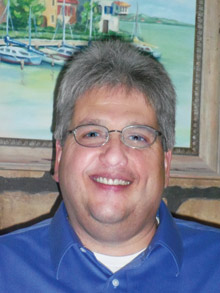Scott Morrical found his calling in the foodservice industry at a very young age. "I started working in breakfast restaurants while in middle school, washing dishes by hand," he says. Morrical then moved on to supper clubs, before becoming a dealer and broadline sales rep to capitalize on what he calls his "gift of the gab".
 Scott MorricalIt turns out this was a successful career move. Morrical has been a sales rep for The Boelter Cos. since 1985, serving mostly independent restaurant operators and the University of Wisconsin-Madison. He is known as a high-energy worker with great follow through and for having an ability to handle complicated projects without flinching.
Scott MorricalIt turns out this was a successful career move. Morrical has been a sales rep for The Boelter Cos. since 1985, serving mostly independent restaurant operators and the University of Wisconsin-Madison. He is known as a high-energy worker with great follow through and for having an ability to handle complicated projects without flinching.
FE&S: You design some of your projects, which is a little out of the ordinary for someone in your position. What do you like most about this?
SM: I like taking a space, developing a goal with customers and succeeding. I think the creation aspect is the fun part of it. I also like being able to take an idea on paper, put it in work form and succeed in making it a reality.
FE&S: You sell a lot of heavy equipment. What's the secret to writing a good equipment specification?
SM: The process is really trial and error. There are certain companies I deal with that stand behind me. Anyone can sell equipment, but if it doesn't work or the customer is not happy with it, then eventually the word gets out. When a manufacturer stands behind the equipment, it makes it easier to utilize their products in a project. Anyone can sell on price, but the end result is the equipment won't hold up, and the customer won't be satisfied.
FE&S: You are known for having very good working relationships with the reps and other members of the supply chain in your area. Why is this important?
SM: Those relationships lead to other relationships. Working with excellent reps makes my job easier. The reps I work with care about their business and the industry.
FE&S: How do you go about sourcing those reps?
SM: Again, it's trial and error, although some of it is word of mouth from other outside sales reps in our company and the industry. People will often relate stories and anecdotes about reps, so it's important to listen.
FE&S: What keeps you working in this industry?
SM: I like to deal with individuals on a regular basis and develop relationships with customers that are long term. I don't deal too much with chains. Instead, I work with owners and decision-makers who I enjoy seeing on a regular basis.
FE&S: What's the biggest way the industry has changed since you first got involved with foodservice?
SM: Everything revolves around information technology, yet I'm still using a flip phone. I don't like change much, but as I learn more about the Internet and AutoQuotes, it's obvious technology makes the job easier. This is a more fast-paced industry compared with where it was 15 years ago.
FE&S: What's the most important lesson you've learned?
SM: Honesty is important. We're not perfect and mistakes do happen. Sales reps need to be up-front with customers, who understand that issues will occur.



